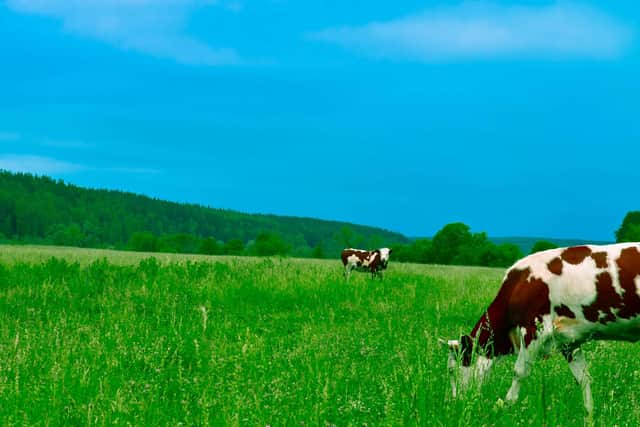Why isn't decent food a basic right for everyone ?- Philip Lymbery
Back in the 1970s, 50 pence was a lot of money, and my father, who always had a big heart, had put his unexpected windfall into a charity box.
It’s a memory still shared at family gatherings, making me smile every time and reminding me how food for the average household has changed dramatically in recent decades. When I was growing up, meat was a treat. The recent World Health Day, serves as a pertinent reminder of the changing value of meat – how it has become a cheap, everyday commodity to the point where it is affecting our health.
Advertisement
Hide AdAdvertisement
Hide AdMeat was a luxury for our family. Chicken for Sunday roast was something ceremoniously presented by my mother. It was a meal that we all looked forward to and celebrated. It was expensive.


But then over the years we started to have chicken more and more until it seemed like we were having it nearly every day. It became so much cheaper.
And for a reason: unbeknown to me at the time, the way chickens were reared was getting ever more intensive: a farming system that squashes chickens together in sheds in their thousands and forces them to put on weight so quickly that their legs often cannot support their bodies.
If someone were to take a live chicken into a big public space – say into the centre of Edinburgh – and treat her to the ordeal experienced in an intensive farm, it would cause a public outcry. The culprit would most likely find themselves in court, on charges of animal cruelty, and rightly so. On farms, that kind of suffering attracts no attention or penalty whatsoever.
Today’s intensively produced chickens not only throw up animal welfare issues, they also represent unhealthy food. Although chicken is often touted as a ‘healthy’ meat, today’s cheap, intensive chicken can have nearly three times the fat and a third less protein than the birds that my mother originally served with such reverence. To achieve the same level of nutrition requires eating a lot more fat and calories.
Our growing appetite for chicken is also causing a growing strain on the planet. It accelerates climate change through deforestation to supply huge amounts of soya, a major part of the modern-day chicken’s diet. Around 850 million chickens are reared for meat in the UK each year; the vast majority confined to intensive farming systems.
With the rising cost of living and so many people having problems making ends meet, it certainly doesn’t feel like our food is cheap. Yet, the Food Farming and Countryside Commission’s February report, ‘Hungry for Health’, reveals that food in the UK costs less as a proportion of people’s income than food in most European countries. Despite this, we still have the unacceptable reality that 4.7 million adults are worried about where their next meal will come from. Many of them are turning to food banks.
Food bank charity, the Trussell Trust, reports high levels of food insecurity in Scotland. Between April and September 2021, over 14,000 food parcels were handed out in Glasgow City alone.
Advertisement
Hide AdAdvertisement
Hide AdOrganisations like the Trussell Trust do amazing work and emergency food aid is definitely helping people in need. But they and other emergency food organisations are the first to agree it’s not a long-term solution.
Simply making food cheaper through production methods that reduce its quality is not the answer either. Cheaper, poor-quality food can lead to even worse health – a malnourished obesity where people eat too much of the wrong thing.
Driven by a food system that is the wrong way up, the consumption of bad food is incentivised through making it cheap and easily accessible.
These policies effectively undermine our National Health Service. Instead, they create a national ill-health service – in recent years, the NHS has spent £6.1 billion on overweight and obesity related ill-health.
In Scotland, there is a shining light – the Good Food Nation Bill. This bill, campaigned for by Nourish Scotland and the Scottish Food Coalition, was put before Parliament in October last year. If adopted, it could become a leading global example of a good food policy and have a transformative effect on the bad.
To truly nourish everyone, our current food system must be transformed so it enables everyone to eat healthy food.
The key to this can be found on pastures, where we graze animals instead of feeding them grain. Compared to pasture-raised beef or free-range chicken, the intensively-farmed equivalent has as much as twice the saturated fat and is lower in other nutrients. As well as producing healthy food, pasture-based farming is nature-friendly and sustainable.
The cost of food needs rebalancing – healthier and more sustainable options must become cheaper and easily accessible – something that governments need to get behind and make happen.
Advertisement
Hide AdAdvertisement
Hide AdIn the UK, where more than half of cropland is used for animal feed, a Harvard University study concluded that one third of cropland currently used to grow animal feed could provide 62 million adults their five portions of fruit and vegetables a day for an entire year – almost the entire UK population.
Such a move could be transformative for a country like Britain that is so heavily dependent on imports.
By transforming our unhealthy food system we can have healthy people and a healthy planet, based on the principle that healthy food should be a basic right for everyone, not a privilege for those that can afford it.
- Philip Lymbery is CEO of Compassion in Farming International, a United Nations Food Systems Champion and author of Farmageddon: The True Cost of Cheap Meat and Dead Zone: Where the Wild Things Were.
